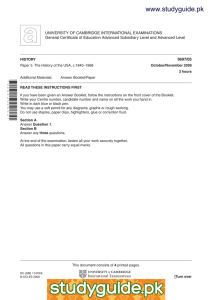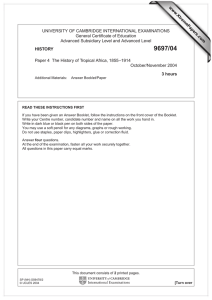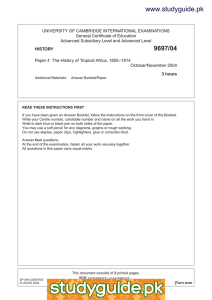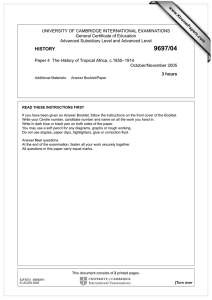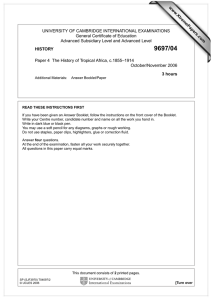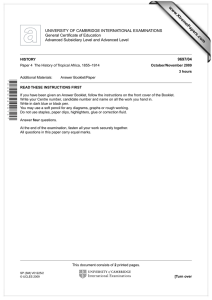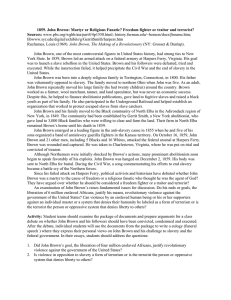www.XtremePapers.com
advertisement
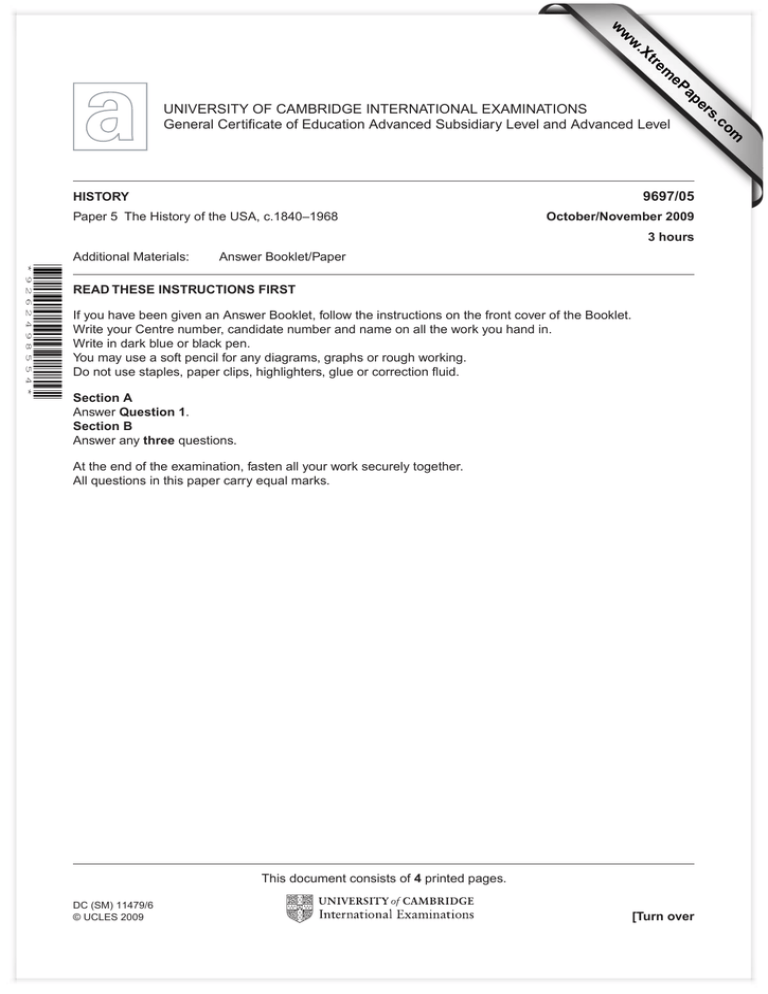
w w ap eP m e tr .X w 9697/05 HISTORY Paper 5 The History of the USA, c.1840–1968 October/November 2009 3 hours Additional Materials: Answer Booklet/Paper *9262498554* READ THESE INSTRUCTIONS FIRST If you have been given an Answer Booklet, follow the instructions on the front cover of the Booklet. Write your Centre number, candidate number and name on all the work you hand in. Write in dark blue or black pen. You may use a soft pencil for any diagrams, graphs or rough working. Do not use staples, paper clips, highlighters, glue or correction fluid. Section A Answer Question 1. Section B Answer any three questions. At the end of the examination, fasten all your work securely together. All questions in this paper carry equal marks. This document consists of 4 printed pages. DC (SM) 11479/6 © UCLES 2009 [Turn over om .c s er UNIVERSITY OF CAMBRIDGE INTERNATIONAL EXAMINATIONS General Certificate of Education Advanced Subsidiary Level and Advanced Level 2 Section A: The Road to Secession and Civil War, 1846–61 You must answer Question 1. JOHN BROWN’S RAID ON HARPER’S FERRY, OCTOBER 1859 1 Read the sources and then answer the question. When answering Question 1, candidates are advised to pay particular attention to the interpretation and evaluation of the sources both individually and as a group. Source A The voice of the Southern people has not been heard, and may never be heard. Let not the people of the North mistake this silence for indifference. The Harper’s Ferry invasion has advantaged the cause of Disunion, more than any other event that has happened since the formation of the Government; it has rallied to that standard men who formerly looked upon it with horror; it has revived, with tenfold strength, the desire for a Southern Confederacy. Previously determined friends of the Union may now be heard saying, ‘If under the Union our peace is disturbed, our State is invaded, its peaceful citizens cruelly murdered, and all the horrors of servile war forced upon us, by those who should be our warmest friends; if the form of the Union is observed, but its spirit violated, and the people of the North sustain the outrage, then let Disunion come.’ Richmond Enquirer, 25 October 1859. Source B I have, may it please the court, a few words to say. In the first place, I deny everything but what I have all along admitted – my plan to free the slaves. I intended certainly to have made a clean thing of that matter, as I did when I went into Missouri and there took slaves and without the snapping of a gun on either side, moved them to Canada. I designed to have done the same thing again on a larger scale. That was all I intended. I never did intend murder, treason, or the destruction of property, or to incite slaves to rebellion, or to make insurrection. I have another objection; it is unjust that I should suffer such a penalty. Had I interfered in the manner which I admit has been fairly proved (for I admire the truthfulness and candour of the witnesses who have testified) – had I so interfered on behalf of the rich, the powerful, the intelligent, the so-called great, or on behalf of any of their friends, or families, it would have been all right; and every man in this court would have deemed it an act worthy of reward, not punishment. This court acknowledges, I suppose, the validity of the law of God. I see a book kissed here, the Bible. That teaches me that all things whatsoever I would that men should do to me, I should do even so to them. It teaches me, further, to remember them that are in bonds, as bound with them. I endeavoured to act up to that instruction. I say that I am yet too young to understand that God is any respecter of persons. I believe that to have interfered as I have done – as I have always freely admitted I have done – on behalf of his despised poor was not wrong, but right. Now, if it is deemed necessary that I should forfeit my life for the furtherance of the ends of justice, and mingle my blood further with the blood of my children and with the blood of millions in this slave country whose rights are disregarded by wicked, cruel, and unjust enactments – I submit; so let it be done! John Brown’s speech to the court following his conviction for murder, conspiracy and treason, 2 November 1859. © UCLES 2009 9697/05/O/N/09 3 Source C It is useless to disguise the fact that the entire North and North-West are now abolitionists. The ‘irrepressible conflict’ between North and South has already commenced. Meetings upon meetings have been told to express sympathy and support for murderers and traitors but none, no, not one solitary expression of disapproval have we seen from any Northern State. And yet they claim to be our brethren and speak the same language, and worship the same God. Do these things indicate affection, brotherly kindness, Union? There can be no Union without affection – there can be no Union unless this aggressive policy of the North is stopped. We yield to none in our veneration of the Union but it is not now the Union that the Fathers bequeathed to us. Wilmington Daily Herald, 5 December 1859. Wilmington is in Delaware, one of the border states. Source D We have seen John Brown walking radiant, serene face to the scaffold and think what an iron heart, what devoted faith! We have seen him stoop on his way to kiss a negro child and then the iron heart seems all tenderness. Marvellous old man! He has abolished slavery in Virginia. You may say this is too much, but history will date Virginia Emancipation from Harper’s Ferry. True the slaves are still there but John Brown has loosened the roots of the slave system – it only breathes – it will not live for much longer. God has said to him you have proved that the Slave State is only fear in the mask of despotism, come up to me and baptize by your martyrdom a million hearts into holier life. Virginia stands at the bar of the civilised world on trial, needing thousands of armed men round the gallows to hang one solitary old man and to guard it from her slaves. In years to come, may God bring Virginia to blot out her shame and cover that hate-filled gallows with thousands of broken chains. John Brown sleeps now with the blessing of the crushed and the poor and men believe more fully in virtue now such a man has lived among us. Wendell Phillips’ speech at the grave of John Brown at his funeral, 8 December 1859. Source E Most people in the North, including Republican leaders like Seward and Lincoln, condemned John Brown as a criminal. But his courage and dignity after capture and his eloquent plea for the slave from the steps of the scaffold won the admiration even of many who disapproved of his wild deeds. Abolitionists glorified him. To Emerson, Brown was ‘a new saint awaiting his martyrdom’; his death would ‘make the gallows glorious like the cross’. On the day of Brown’s execution funeral bells tolled throughout the North. No single event did more to embitter the South or to convince it that there was no safety for slavery within the Union. Though the raid failed, it alarmed and horrified Southerners by reviving the recurrent nightmare of a slave insurrection. But Northern approval of the raid had even greater effects. It persuaded the South that every Northerner was implacably hostile to slavery and that the Republican party had been behind Brown and that it fully intended, despite its leaders’ denials, to abolish slavery. Hence the feeling grew in the slave states that secession ought not wait upon an overt act of hostility against the South by a Republican Administration but should immediately follow a Republican victory. A modern historian’s account of the raid on Harper’s Ferry, 2004. Now answer the following question. ‘John Brown was not an heroic martyr but an irresponsible criminal.’ Using Sources A–E, discuss how far the evidence supports this assertion. © UCLES 2009 9697/05/O/N/09 [Turn over 4 Section B You must answer three questions from this section. 2 What caused America’s rapid territorial expansion in the 1840s? 3 To what extent was Reconstruction a failure? 4 Why did organised labour have so little impact on American society from 1865 to 1917? 5 Examine the reasons for the civil rights of Native Americans being largely overlooked for most of the period 1895–1968. 6 Which groups benefited most from the New Deal and which the least? 7 Discuss the view that the Spanish-American War marked the emergence of the United States as a world power. 8 Analyse the reasons for the dramatic change in social attitudes and lifestyles that occurred in America in the 1960s. Copyright Acknowledgements: Source E © Maldwyn A. Jones, The Limits of Liberty: American History 1607–1992, Oxford University Press, 2004. By permission of Oxford University Press, Inc. Permission to reproduce items where third-party owned material protected by copyright is included has been sought and cleared where possible. Every reasonable effort has been made by the publisher (UCLES) to trace copyright holders, but if any items requiring clearance have unwittingly been included, the publisher will be pleased to make amends at the earliest possible opportunity. University of Cambridge International Examinations is part of the Cambridge Assessment Group. Cambridge Assessment is the brand name of University of Cambridge Local Examinations Syndicate (UCLES), which is itself a department of the University of Cambridge. © UCLES 2009 9697/05/O/N/09
